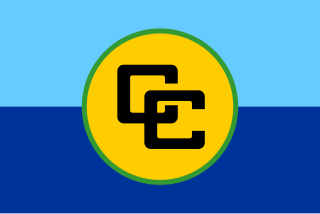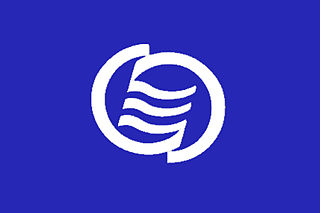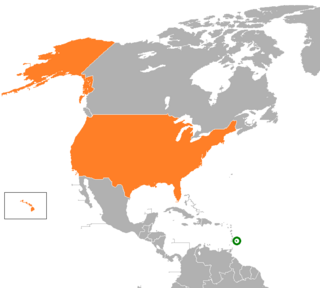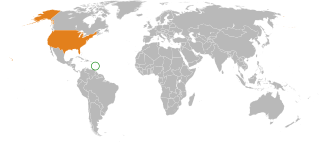
The Caribbean Community is an intergovernmental organisation that is a political and economic union of 15 member states and five associated members throughout the Americas, The Caribbean and Atlantic Ocean. It has the primary objective to promote economic integration and cooperation among its members, ensure that the benefits of integration are equitably shared, and coordinate foreign policy. The organisation was established in 1973, by its four founding members signing the Treaty of Chaguaramas. Its primary activities involve:

The Association of Caribbean States is an advisory association of nations centered on the Caribbean Basin. It was formed with the aim of promoting consultation, cooperation, and concerted action among all the countries of the Caribbean coastal area. The primary purpose of the ACS is to promote greater trade between the nations, enhance transportation, develop sustainable tourism, and facilitate greater and more effective responses to local natural disasters.
The Caribbean-Canada Trade Agreement known as ("CARIBCAN") is a Canadian government programme, established in 1986 by the Parliament of Canada. The agreement was created to promote trade, investment and provide industrial cooperation through the preferential access of duty-free goods from the countries of the Commonwealth-Caribbean to the Canadian market.

The CARICOM Single Market and Economy, also known as the Caribbean Single Market and Economy (CSME), is an integrated development strategy envisioned at the 10th Meeting of the Conference of Heads of Government of the Caribbean Community (CARICOM) which took place in July 1989 in Grand Anse, Grenada. The Grand Anse Declaration had three key Features:
- Deepening economic integration by advancing beyond a common market towards a Single Market and Economy.
- Widening the membership and thereby expanding the economic mass of the Caribbean Community.
- Progressive insertion of the region into the global trading and economic system by strengthening trading links with non-traditional partners.

The Regional Security System (RSS) is an international agreement for the defence and security of the eastern Caribbean region with future expansion planned with South America.

The Caribbean Free Trade Association (CARIFTA) was an English-speaking economic trade organisation. It organised on 1 May 1968, to provide a continued economic linkage between the English-speaking countries of the Caribbean. The agreements establishing it came following the dissolution of the West Indies Federation, which lasted from 1958 to 1962.

The United States and Barbados have had cordial bilateral relations since Barbados' independence in 1966. The United States has supported the government's efforts to expand the country's economic base and to provide a higher standard of living for its citizens. Barbados is a beneficiary of the U.S. Caribbean Basin Initiative. U.S. assistance is channeled primarily through multilateral agencies such as the Inter-American Development Bank and the World Bank, as well as the U.S. Agency for International Development (USAID) office in Bridgetown.

Saint Lucia – United States relations are bilateral relations between Saint Lucia and the United States. Roger F. Nyhus is the U.S. Ambassador to St. Lucia.

This article deals with the diplomatic affairs, foreign policy and international relations of Barbados.
The Third Border Initiative (TBI) is an area of policy concerning United States and the Caribbean region. The phrase was especially made popular by the administration of US president George W. Bush. The Third Border Initiative was a reference to the Caribbean region's adjacent placement to the United States. The policy is the ideology that behind Canada and Mexico the Caribbean region is a sea-based border of the United States.
The nation of Barbados has been a supporter of the Caribbean Community (CARICOM). Barbados was one of the four founding members in 1973 which then along with Guyana, Jamaica, and Trinidad and Tobago moved to establish the organization then known as the Caribbean Community and Common Market. This new organization became a successor to the Caribbean Free Trade Association (CARIFTA) of which Barbados was also a member.

Barbados–Guyana relations refers to the current and historical relationship between Barbados and Guyana. The former maintains non-resident diplomatic representation from Bridgetown, while Guyana which prior had a High Commissioner to Barbados appointed its first resident Consul-General, Michael Brotherson to Bridgetown in January 2012.

Barbados and Trinidad and Tobago formally established diplomatic relations on Barbados' national date of independence, 30 November 1966. Barbados maintains non-resident representation to Port of Spain, and the Republic of Trinidad and Tobago maintains non-resident representation to Bridgetown. Both countries are members of many shared organisations, including the Association of Caribbean States, the Commonwealth of Nations, CARICOM, CARIFORUM, and the Community of Latin American and Caribbean States.

Foreign relations between Barbados and Japan were formally established on 29 August 1967. Japan is accredited to Barbados from its Embassy in Bridgetown (Barbados) and an honorary consulate in the parish of Saint George. Barbados is represented in Japan through a non-resident ambassador in Bridgetown. Japan's new Ambassador for Barbados, Mitsuhiko Okada had announced a new direct embassy to Barbados would be established located in Bridgetown in February 2016.

Barbadian-French relations are the bilateral relations between the two countries, Barbados and France. Both countries have established diplomatic relations on May 3, 1968. Barbados is represented in France through its embassy in Brussels (Belgium). France is represented in Barbados through its embassy in Castries, led by and an additional honorary consulate in Bridgetown.
The nation of Trinidad and Tobago has been the leading supporter of the Caribbean Community (CARICOM). Trinidad and Tobago was one of the four members in 1973 which then along with Barbados, Guyana and Antigua and Barbuda moved to establish the organisation that today it known as the Caribbean Community and Common Market. The new organisation because a successor to the Caribbean Free Trade Association (CARIFTA) by the Treaty of Chaguaramas, of which Trinidad and Tobago was a leading member and also a founding member.

A member state of the Caribbean Community is a state that has been specified as a member state within the Treaty of Chaguaramas or any other Caribbean state that is in the opinion of the Conference, able and willing to exercise the rights and assume the obligations of membership in accordance with article 29 of the Treaty of Chaguaramas. Member states are designated as either More economically developed country (MDCs) or Less economically developed countries (LDCs). These designations are not intended to create disparity among member states. The Community was established by mainly English-speaking Caribbean countries, but has since become a multilingual organisation in practice with the addition of Dutch-speaking Suriname in 1995 and French-speaking Haiti in 2002. There are fifteen full members of the Caribbean Community, four of which are founding members.

The nations of Barbados and the Mexico established diplomatic relations in 1972. Both nations are members of the Association of Caribbean States, Community of Latin American and Caribbean States, Organization of American States and the United Nations.













